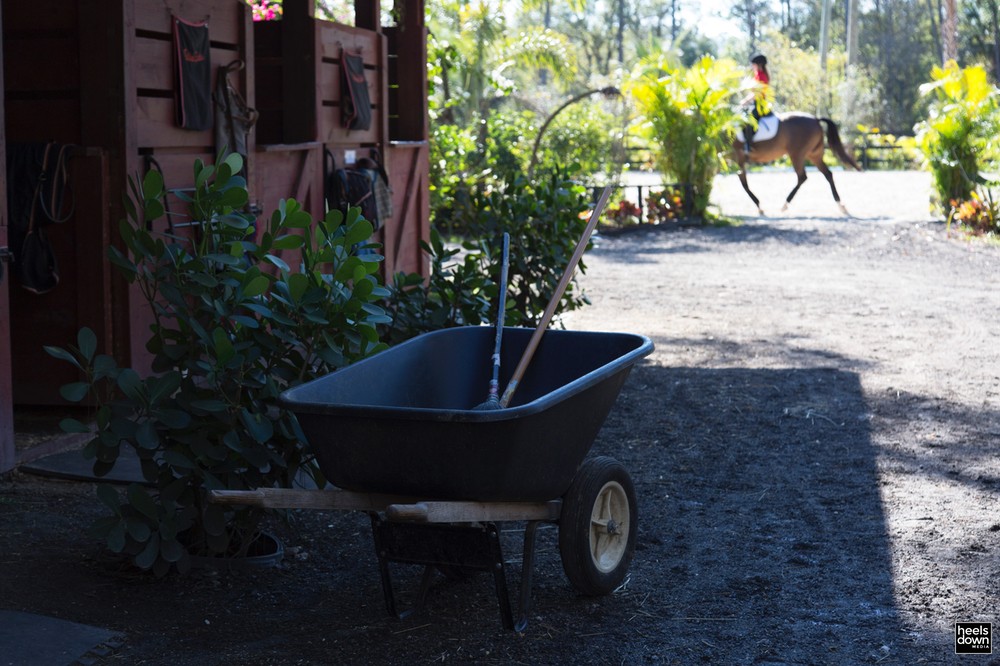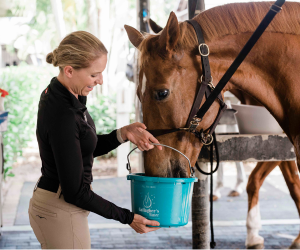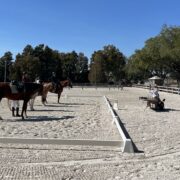Did You Read The Fine Print On Your Boarding Contract?

Did you read your boarding contract completely before signing it? If you’re like me, there may have been some wording in there that made you uncomfortable, or your eyes might have glazed over halfway through. But is there really any room for negotiation or questions when it comes to boarding agreements anyway?
When I signed my first barn contract as the sole adult responsible for my horse, I was comforted by the fact that it looked like a standard agreement downloaded from the internet. I read through all the pages, but felt secure in my relationship with the trainer and farm owner and signed without pushback.
What was in the contract that came back to bite me? The termination of agreement clause, which was worded as such:
Termination of Agreement:
a) Boarder : boarder agrees that thirty (30) days written notice shall be given to [farm] as to the termination of this agreement. Such notice must be acknowledged by Stable in writing. Early termination of this Agreement does not relieve Boarder of fees due for the remaining term of agreement, or for any fees past due and owing.
b) Stable : [farm] reserves right of immediate termination for (a) failure of boarder to pay in full all fees and charges within a thirty-day billing cycle, (b) if said horse develops undesirable behaviors that are not conducive to Stable operations or it becomes dangerous to either life or property, or (c) for good cause, including but not limited to, Stable’s belief that the boarder has contributed to or created disruption or disharmony of the Stable operations.
Stable agrees to give the boarder thirty (30) days’ notice of termination of this agreement for any reasons other than those identified in Paragraph #1 as cause for immediate termination.
Open-ended termination clause alert!
When I first started riding with my former trainer, I was a model client. I paid every bill on time, took multiple lessons a week, and traveled and paid for training at every show. I was at the barn 5-6 days a week and always left everything the way I found it, I cleaned up after myself meticulously, and I didn’t have any extra supplements or care requirements. I didn’t argue about anything. Unfortunately, barn dynamics often change, and there was a problem from the start of my transition from leaser to boarder.
When I was horse shopping, I sent my trainer a listing I found on Facebook. I told her I was going to see the horse the following day, and she hitched up her trailer and bought the horse for herself as a flip that afternoon. Red flag, but I talked myself into being okay with it. Two months later, when the trainer tried to sell the horse to me for a five-figure profit, I was still in a wildly delusional mindset and almost went ahead with the purchase until he failed the PPE miserably. My trainer claimed I was not serious about buying a horse because no one serious about buying a horse does a PPE. Okay, still delusional and willing to ignore any and all of the red flags starting to pop up like weeds. Of course, as the horse sat unsold, the trainer started to take her frustrations out on me.
A few months later, I found another horse and bought him despite the back pain he presented in his exam. I figured it was a case of too much, too soon – running Novice level eventing 5 months after his last race in a standard CWD jump saddle, as one of the only OTTB flips in a string of 6-figure warmblood sales horses. The purchase was also probably slightly influenced by wanting to prove to my trainer that I was serious about buying a horse.
I had roughly 3 months of glorious horse ownership before things took a turn. Despite a rigorous schedule of lessons including flatwork, cavalletti and gymnastics, regular hill work, hacking and proper lunging, my horse was not gaining muscle. He was consistently slipping in the stifle and not picking his feet up over jumps. While I was on vacation, I paid the trainer to ride him and she sent me a message saying that my horse was flinging himself over jumps like he didn’t know where his feet and body were. She said that I could do what I wanted, but she was never going to jump him again. Her advice was that I had bought a dud that would only ever be useful for trail-riding and I should sell him and get something else.
I was unwilling to follow her advice. I worked my way through different vets, getting their opinion and letting them run any test they thought might help including a trip to a well-regarded clinic for an exam and nuclear bone scan. While there was clearly something wrong with my horse, we were in a gray area of questioning if it was pain, training, muscle, neurologic, and most of all, if it was treatable. I was worried constantly.
Eventually, I had a diagnosis of EPM. My horse responded to the medication but then quickly relapsed. The problem with EPM, and many other horse injuries, is that sometimes it’s misunderstood and most of the time people have vastly different ideas on treatment. Couple this with boarding at your trainer’s farm, and you’ve got yourself a disaster waiting to happen. I chose to follow my vet’s advice to the letter with expensive medications and movement therapy. I was at the barn every day, administering pills myself and doing little things that I could, like hand-walking on trails and in-hand work in the arena.
I saw a lot of things during that time, including the trainer letting people ride boarded horses without the owner’s permission. I kept my mouth shut, kept my head down, and worked diligently on my own problems. Other boarders asked me why I hadn’t put my horse down yet, and I responded that the vet said there was hope for a full recovery. My horse had good days and bad, but I persisted. I took lessons on my trainer’s horses while I rehabbed my own horse because I badly wanted to stay a part of the team and connected with my barn family.
One day, I got an email from the trainer saying she was concerned about my horse’s diagnosis because she didn’t understand EPM and he did not seem to be getting better. She required a letter from the vet saying my horse was safe to ride or even be outside of his stall. My vet was happy to oblige. The next time my vet was at the farm, she mentioned the potholes in the driveway within earshot of my trainer, who then told me that my vet was banned from the property because she had heard rumors of malpractice. I didn’t argue, but I started looking for a new barn.
Shortly after that, I woke up to a barrage of text messages. According to my trainer, my horse had bitten the girl that feeds and then proceeded to trip and fall head-over-tail down the hill at turnout. The barn staff was traumatized. She also sent me videos of my horse digging a hole in the field (if your horse is doing this, it is highly possible that he is undernourished). She told me that she had contacted a vet who was willing to take him at her farm but required an exam first, all of which was set up for that day because I was to vacate immediately. I went to the barn, hitched up my trailer, left all the feed I had paid for and started to pack my things. The trainer followed me around yelling at me that I was abusing my horse and she could no longer allow it. How could I be so cruel as to not put him down? She said that she had been watching me on the indoor arena cameras and the fact that I was walking my horse over tarps and poles was beyond abuse when he was sick. She had it all recorded.
I asked her to give me a little space and let me leave in peace, and she got closer and louder. I was by myself and to this day am so thankful that my horse loaded without issue, that my vet had an open stall for the two weeks we were homeless, and that I already had a new barn lined up for the following month. Just like that, I was kicked out of my barn mid-month, without deposit return or prorate. I paid a daily fee for the clinic my horse stayed at where he was under constant supervision and never demonstrated a single odd behavior.
I did not talk badly about that trainer to any of my friends still at the barn, I only cautioned them to have a backup plan if they ever decided to disagree with the trainer on anything. Years later, almost every single boarder ended up getting burned by this trainer, who sold her farm and disappeared. As everyone moved on to new trainers, most of us realized the level of horsemanship provided at that barn – both through lessons, barn management and general horse welfare, was woefully lacking. But sometimes, you don’t want to believe it or can’t see it when you’re in the thick of things. I thought my trainer was a close friend of mine, and I still got kicked out with no notice.
Even though my story is more an exception than a rule, I now always question signing anything with an immediate termination clause and urge you to as well – or at least always make sure you have a backup plan. The ability to move your horse at a moment’s notice, for a random reason, takes resources. I was incredibly lucky to have a relationship with a vet that had space on her farm, and to have enough funds to cover the lost board, temporary housing and the lost damage deposit. I didn’t go to small claims court because I wanted to be done and focus on positive recovery for both myself and my horse. There is a lot of trust that goes into a boarding and training relationship and unfortunately, sometimes that trust is misplaced. While I can understand that barn management needs to have the ability to maintain safety and peace on their property, you must also look out for your own safety and peace.
I now always ask for notice of termination in my boarding contract. Some barns agree to change their wording, and some won’t. Regardless, I ask about the history of immediate termination to help inform my decision. It can be incredibly difficult to read through the legal jargon in some contracts, but take it from me – always read the fine print!


